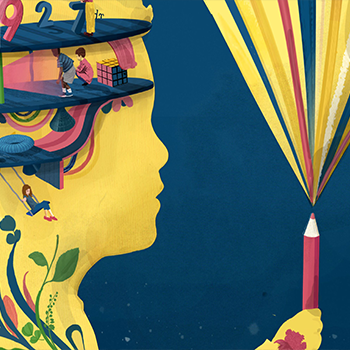Shopping Cart (0)
Your cart is currently empty.
TRIPLET30: 30% off on purchase of 3 books
Your cart is currently empty.

The early years in a child's life are crucial and are a strong foundation for future health and development. Children are dependent on parents and caregivers to develop the right skills. Communicating and exposing them to books, stories and music improves their language, brain development and makes them more imaginative thus setting them on a path towards learning and succeeding in life.
A challenging task indeed! The mantra though is fairly simple - Reading, which encapsulates both academics and literature. A US study found that when personalized components were added to academic books, the reading comprehension scores of students saw a boost of more than 40% when compared to their peers who read non-personalized stories.
RAND Education experts partnered with the Bill and Melinda Gates Foundation in the pursuit to figure out how effective Personalized Learning (PL) really is. PL is based on a thorough understanding of the needs and goals of every individual student. While the research is still ongoing, one of their key findings was an improvement in maths scores. This customized learning facilitated by technology is termed “digital personalization’ in early childhood studies and ‘technology-enhanced personalized learning’ in secondary and higher education.
Let’s understand this new-age digital personalization concept a little more.
Digital Personalization

Over the last few years, personalization has been on the rise across categories, and everyone wants to gift something personal and unique. Personalized ornaments, clothes, puzzles, stickers are a few from a wide range of gifts that you can choose from.
Ensuring that your child consciously abandons gadgets and PlayStations and inculcates the art of reading is no easy task. Here is when the art of personalization steps in and makes the task easy. It is a proven fact that children who read or are read stories that personalize the name of the main character, gender, avatar, and storyline are more engaged.
This also gives them a sense of inclusion since the child, regardless of race, disability, or background, is the protagonist of the personalized book. Also, the book is treasured and cherished by the child forever. It helps to inculcate imagination, creativity, education, and self-esteem among kids through the right blend of personalized storytelling, art, and technology. So, jumping on the bandwagon of digital personalization, some companies doing exemplary work in this field include Merlinwand, Wonderbly, and Hooray Heroes.
Top Four Benefits of Personalized Storybooks

Studies suggest that children who start reading at an early age have a high chance of excelling in their high school. The hidden benefit of families reading together is the intimate bond that it creates between parents and children.
Bottomline
When the child mindfully engages with a book for hours, it helps develop an increased attention span, and by fostering a love of reading in your child at a young age, you can be sure that a commitment to lifelong learning will follow. So begin by designating a reading place and introducing your youngster to personalized literature. This gives them a sense of inclusion, as the child is the protagonist of the personalized book, regardless of ethnicity, disability, or origin. So, encourage your child to pick up a book, put on their creative hats, and dive into the world of stories.
You have no items in wishlist.
We will send you an email to reset your password.
| Title |
|---|
| Price |
| Add to cart |
| Type |
| Vendor |
